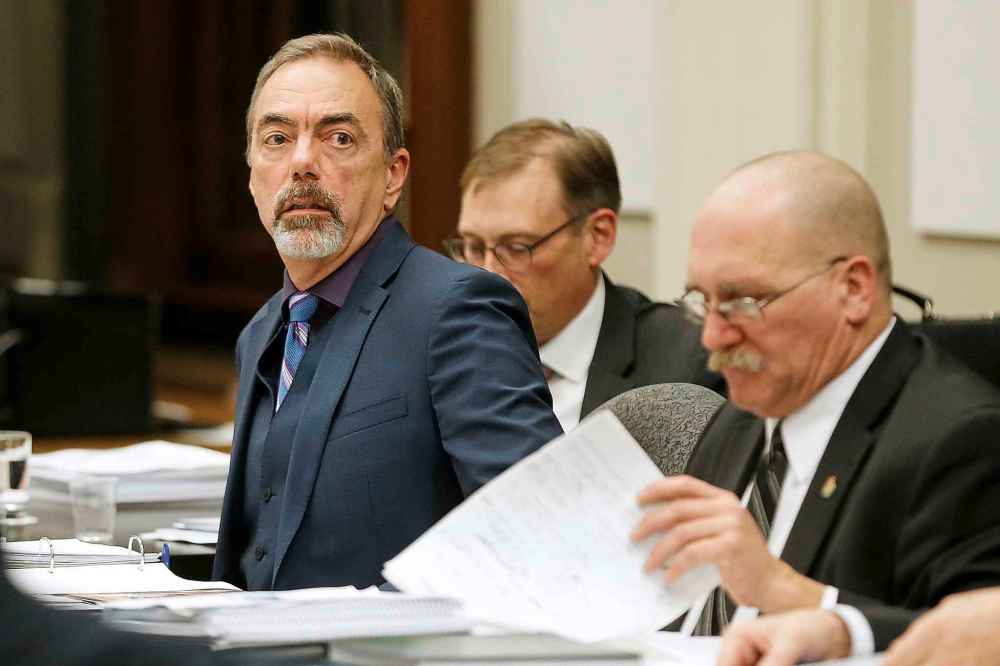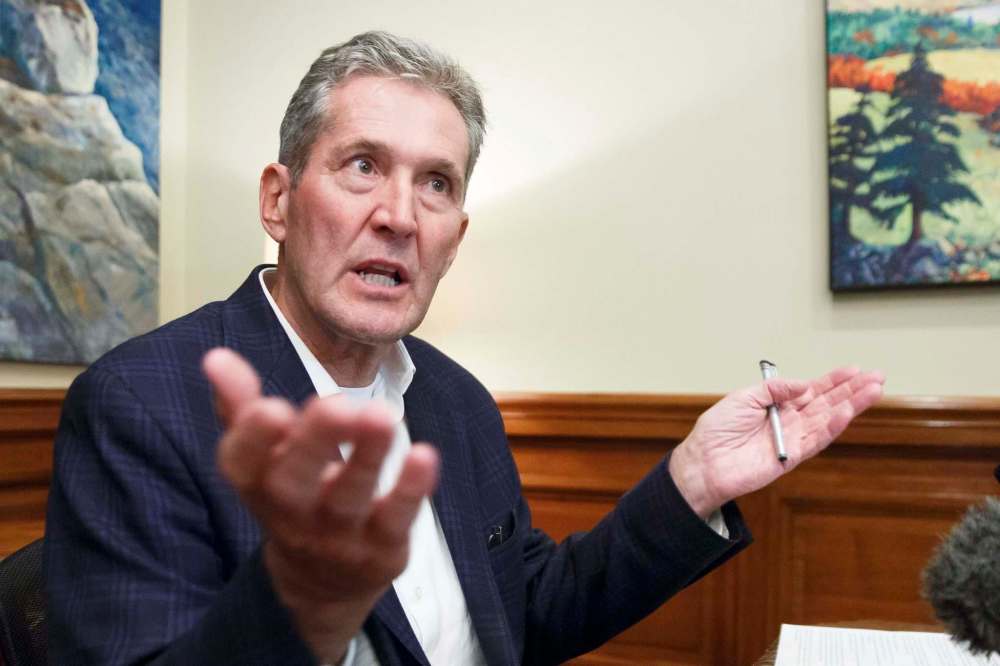Call to account: Auditor general may be retiring, but his issues involving province’s bookkeeping remain unresolved
Read this article for free:
or
Already have an account? Log in here »
To continue reading, please subscribe:
Monthly Digital Subscription
$0 for the first 4 weeks*
- Enjoy unlimited reading on winnipegfreepress.com
- Read the E-Edition, our digital replica newspaper
- Access News Break, our award-winning app
- Play interactive puzzles
*No charge for 4 weeks then price increases to the regular rate of $19.00 plus GST every four weeks. Offer available to new and qualified returning subscribers only. Cancel any time.
Monthly Digital Subscription
$4.75/week*
- Enjoy unlimited reading on winnipegfreepress.com
- Read the E-Edition, our digital replica newspaper
- Access News Break, our award-winning app
- Play interactive puzzles
*Billed as $19 plus GST every four weeks. Cancel any time.
To continue reading, please subscribe:
Add Free Press access to your Brandon Sun subscription for only an additional
$1 for the first 4 weeks*
*Your next subscription payment will increase by $1.00 and you will be charged $16.99 plus GST for four weeks. After four weeks, your payment will increase to $23.99 plus GST every four weeks.
Read unlimited articles for free today:
or
Already have an account? Log in here »
Hey there, time traveller!
This article was published 04/10/2019 (2267 days ago), so information in it may no longer be current.
It is unlikely Manitoba Auditor General Norm Ricard will explain exactly why he stunned political observers on Friday and announced he will retire midway through his 10-year term of office.
Was it related to a personal issue, or perhaps some professional challenge? Given the institutional discretion with which auditors general conduct their business, we may never know.
What we do know is that in leaving now, he leaves a major issue of government bookkeeping unresolved.

For two straight years, Ricard has refused to sign off on the province’s public accounts, the definitive record of government finances, because Premier Brian Pallister and his Tory government have continued to violate the rules of Public Sector Accounting Principles.
Last week, Ricard demonstrated the gravity of his concern by issuing a rare but not unprecedented special report to the legislature on his decision not to qualify the province’s books for a second year. In it, he notes two “material misstatements” in the public accounts.
The misstatements relate to the Tory government’s decision to remove both the Workers Compensation Board (WCB) and the Manitoba Agricultural Services Corporation (MASC) from the summary financial statements, the very foundation of the public accounts.
Ricard said that because both entities are legally and administratively within the direct control of government, they must be included in the government’s balance sheet. The Pallister government disagrees. The result is that for two years, we have incomplete public accounts.
At first blush, the decision to exclude these two entities seems at odds with Pallister’s fiscal goal of balancing the budget. Both entities are flush with assets; in the case of MASC, there is also an enormous operating surplus.

If Pallister had left both entities on the province’s books, Ricard believes the premier could have reported a surplus in both the 2018-19 and 2019-20 budgets and lowered net debt. Instead, the Pallister government reported deficits in both years and, by excluding the enormous reserve assets of both entities, net debt is $1 billion higher.
Why would Pallister, a man who values fiscal responsibility more than two uninterrupted weeks in Central America, endure unnecessary deficits and higher debt? Political sources believe Pallister wants to maintain the illusion of deficit so he can use it as context for continued austerity.
In the 2018-19 public accounts, the Tory government came in $215 million under budget in health care and $79 million in education. Without a lingering deficit to justify that austerity, it just looks mean-spirited.
Ricard has another explanation: he believes Pallister is playing the long game, trading a bit of budget pain now for considerably less budgetary volatility down the road.
In his report to the legislature, Ricard notes officials from the finance department told him their accounting strategy was designed “to reduce the volatility of reported results.”
Now, reducing volatility on its own is not a nefarious motivation. However, when we’re talking about government financial statements, reducing volatility can quickly become code for a political manipulation of the books.
Both the WCB and MASC are insurance schemes that seek to protect workers and farmers. In the former, it’s injuries at work; in the latter, it’s weather and market-related downturns that threaten the livelihood of producers. Both are primarily self-funded (WCB by workers and employers; MASC by producers with contributions from the federal and provincial governments) and by law, their assets cannot be used by government for any purpose other than helping workers and farmers.

With more than $1 billion in combined assets, it’s hard to see where the volatility exists. However, that is just on the asset side; on the operations side, there is more uncertainty.
For example, the same year the province decided to remove the WCB from the books, it announced a $74-million premium rebate to employers. Growth Enterprise and Trade Minister Blaine Pedersen denied that government directed the rebates, but acknowledged he “encouraged” the WCB to use some of its more than $600 million in reserve assets to return money to employers.
The result was that WCB recorded a $52-million operating loss in 2018-19. If WCB had been on the books, that would have increased the province’s stated deficit of $163 million to $215 million. And with future rebates always a possibility, the WCB could represent a drag on efforts to balance the summary budget for years to come.
Finance Minister Scott Fielding denied reducing volatility is the primary motivator for removing the WCB and MASC from the books. In an interview, he said government wants to eliminate entities that are self-financing and set up for specific purposes that government cannot change or compromise.
On the WCB, Fielding said the government will amend legislation to make it abundantly clear it is no longer under any government control. For MASC, the government simply disagrees with Ricard’s opinion.
“It’s not our money,” Fielding said. “It’s the farmer’s money.”
It may be, but both the WCB and MASC seem to be largely under government control. We can see that in Minister Pedersen’s encouragement for the decision to rebate WCB premiums to employers. And just last week, Agriculture Minister Ralph Eichler issued a news release to announce a new MASC program to help cattle producers.
The WCB and MASC may be gone from the government’s books. But as long as the auditor general is on the case, they — and the reasons they were stricken from the balance sheet — will not be forgotten.
dan.lett@freepress.mb.ca

Dan Lett is a columnist for the Free Press, providing opinion and commentary on politics in Winnipeg and beyond. Born and raised in Toronto, Dan joined the Free Press in 1986. Read more about Dan.
Dan’s columns are built on facts and reactions, but offer his personal views through arguments and analysis. The Free Press’ editing team reviews Dan’s columns before they are posted online or published in print — part of the our tradition, since 1872, of producing reliable independent journalism. Read more about Free Press’s history and mandate, and learn how our newsroom operates.
Our newsroom depends on a growing audience of readers to power our journalism. If you are not a paid reader, please consider becoming a subscriber.
Our newsroom depends on its audience of readers to power our journalism. Thank you for your support.










